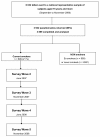The French Observational Cohort of Usual Smokers (FOCUS) cohort: French smokers perceptions and attitudes towards smoking cessation
- PMID: 20184784
- PMCID: PMC2841669
- DOI: 10.1186/1471-2458-10-100
The French Observational Cohort of Usual Smokers (FOCUS) cohort: French smokers perceptions and attitudes towards smoking cessation
Abstract
Background: Despite increasing governmental anti-smoking measures, smoking prevalence remains at a high level in France.
Methods: The objectives of this panel study were (1) to estimate smoking prevalence in France, (2) to identify smokers' profiles according to their perceptions, attitudes and behaviour in relation to smoking cessation, (3) to determine predictive factors of quit attempts, and (4) to assess tobacco-related behaviours and their evolutions according to the changes in the smokers' environments. A representative sample of French population was defined using the quota method. The identified cohort of smokers was assessed, in terms of smoking behaviour, previous quit attempts, and intention to quit smoking.
Results: A response rate of 66% for the screening enabled to identify a representative sample of the French population (N = 3 889) comprising 809 current smokers (21%). A majority of current smokers (63%) had made an attempt to quit smoking. Main reasons for having made the last attempt were cost (44%), social pressure (39%), wish to improve physical fitness (36%), fear of a future smoking-related disease (24%), and weariness of smoking (21%). Few attempts (16%) were encouraged by a physician. In those who used some kind of support (38%), NRT was the mostly used. Relapse was triggered by craving (45%), anxiety/stress (34%), a significant life event (21), weight gain (18%), and irritability (16%). Depression was rarely quoted (5%). Forty percent of smokers declared they intended to quit smoking permanently. Main reasons were cost (65%), physical fitness improvement (53%), fear of a future smoking-related disease (43%), weariness of tobacco (34%), and social pressure (30%). Using a smoking cessation treatment was considered by 43% of smokers that intended to quit. Barriers to smoking cessation were mainly fear of increased stress (62%), irritability (51%), and anxiety (42%), enjoying smoking (41%), and weight concerns (33%).
Conclusion: Smoking prevalence and smoking cessation attempts rate were lower in this survey than in previous reports. Cost and social pressure were the main reasons for quitting smoking, maybe an effect of dramatic tax increases and smoking ban.
Similar articles
-
[I will quit tomorrow... Statistical portrayals of "dissonant smokers''].Rev Epidemiol Sante Publique. 2003 Apr;51(2):215-26. Rev Epidemiol Sante Publique. 2003. PMID: 12876507 French.
-
Time preferences, socioeconomic status and smokers' behaviour, attitudes and risk awareness.Eur J Public Health. 2013 Oct;23(5):783-8. doi: 10.1093/eurpub/cks189. Epub 2013 Jan 23. Eur J Public Health. 2013. PMID: 23345320
-
Prospective predictors of quitting behaviours among adult smokers in six cities in China: findings from the International Tobacco Control (ITC) China Survey.Addiction. 2011 Jul;106(7):1335-45. doi: 10.1111/j.1360-0443.2011.03444.x. Epub 2011 May 27. Addiction. 2011. PMID: 21438942 Free PMC article.
-
Why do smokers try to quit without medication or counselling? A qualitative study with ex-smokers.BMJ Open. 2015 Apr 30;5(4):e007301. doi: 10.1136/bmjopen-2014-007301. BMJ Open. 2015. PMID: 25933811 Free PMC article. Review.
-
[Smoking reduction and temporary abstinence: new approaches for smoking cessation].J Mal Vasc. 2003 Dec;28(5):293-300. J Mal Vasc. 2003. PMID: 14978435 Review. French.
Cited by
-
Factors affecting commencement and cessation of smoking behaviour in Malaysian adults.BMC Public Health. 2012 Mar 19;12:207. doi: 10.1186/1471-2458-12-207. BMC Public Health. 2012. PMID: 22429627 Free PMC article.
-
A Cross-sectional Study to Assess Factors that Determine Tobacco Habit Initialization and Cessation and Oral Cancer Awareness among General Population of Vikarabad District, Telangana.J Pharm Bioallied Sci. 2021 Nov;13(Suppl 2):S1613-S1619. doi: 10.4103/jpbs.jpbs_312_21. Epub 2021 Nov 10. J Pharm Bioallied Sci. 2021. PMID: 35018040 Free PMC article.
-
Group hypnotherapy versus group relaxation for smoking cessation: an RCT study protocol.BMC Public Health. 2012 Apr 4;12:271. doi: 10.1186/1471-2458-12-271. BMC Public Health. 2012. PMID: 22475087 Free PMC article. Clinical Trial.
-
Inpatient smoking cessation therapy: truth or dare?Wien Klin Wochenschr. 2015 Oct;127(19-20):786-91. doi: 10.1007/s00508-015-0820-9. Epub 2015 Jul 4. Wien Klin Wochenschr. 2015. PMID: 26142170
-
Coping Strategies and Social Support in a Mobile Phone Chat App Designed to Support Smoking Cessation: Qualitative Analysis.JMIR Mhealth Uhealth. 2018 Dec 20;6(12):e11071. doi: 10.2196/11071. JMIR Mhealth Uhealth. 2018. PMID: 30573445 Free PMC article.
References
-
- Hughes JR. Tobacco treatment specialists: A new profession. Journal of smoking cessation. 2008;2(supplement):2–7.
-
- Peto R, Lopez AD, Boreham J, Thun M, Heath C Jr, Doll R. Mortality from smoking worldwide. Br Med Bull. 1996;52(1):12–21. - PubMed
MeSH terms
LinkOut - more resources
Full Text Sources
Medical


